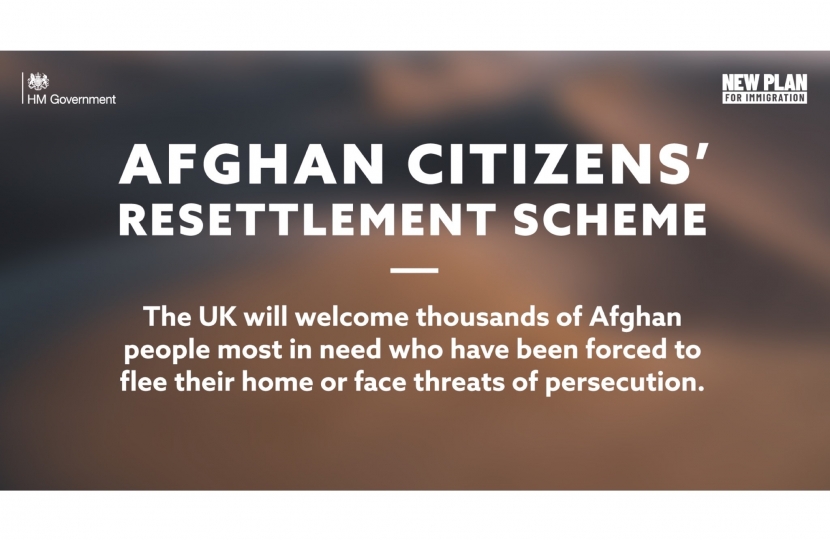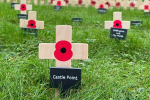
Yesterday, the Prime Minister updated the House of Commons on our five-point plan to support the people of Afghanistan and contribute to regional stability by using every tool at our disposal and working with our international friends and allies.
It is essential that the international community come together and take a unified approach on Afghanistan, both in terms of the future of the country and in working to prevent a humanitarian and refugee crisis. That is why the Prime Minister yesterday set out to the House of Commons our five point proposal to work with our international partners on a shared plan to support the people of Afghanistan and contribute to regional stability.
As the first step, we are deploying 900 defence personnel and teams of officials to repatriate British nationals and resettle Afghan staff who put their lives at risk to support the UK, with more than 2,052 Afghan staff arriving in the UK so far as we streamline visa applications and keep the exit door open.
The Government is also hosting G7 summits to coordinate the international response, including a Foreign Minister’s summit today ahead of a G7 Leader’s summit next week, doubling the amount of humanitarian assistance to Afghanistan to £286 million, creating a new legal routes for up to 20,000 Afghan refugees to be resettled in the UK (in addition to existing routes already in operation), and urging our allies to hold off on prematurely recognising any new regime and take a unified approach to Afghanistan.
The Government remains committed to Afghanistan and will continue to use every diplomatic and humanitarian lever to help the people of Afghanistan to choose the best of all their possible futures.
Helping Afghan Refugees
We owe a debt of gratitude to all those who have worked with the United Kingdom to make Afghanistan a better place over the last twenty years. Many of them, particularly women, are now in urgent need of our help. That is why the Government is establishing a new route for Afghan citizens - prioritising women and girls - who have been forced to flee their home or face threats of persecution from the Taliban to set up home in the UK permanently. This is in addition to existing programmes and routes already established and in operation.
The UK has a proud history of welcoming those fleeing persecution or oppression, and this Government will always stand by all those around the world who need our help in their hour of need.
We are doing this by:
- Establishing the new Afghanistan Citizens’ Resettlement Scheme to resettle thousands of Afghan women and children under one of the most generous resettlement schemes in our country’s history. This new route is modelled on the successful Syrian Vulnerable Persons Resettlement Scheme, which resettled 20,000 Syrian refugees over a seven-year period from 2014 to 2021.
- The Afghanistan Citizens’ Resettlement Scheme will prioritise women and girls, and religious and other minorities, who are most at risk of human rights abuses and dehumanising treatment by the Taliban. The UK is working with international partners to develop a system to identify those most at risk and resettle them, ensuring help goes to those that need it. The Government will work with the devolved administrations and local councils to ensure that Afghans who will be rebuilding their lives in the UK have the help they need and support to integrate.
- This new route is separate from, and in addition to, the existing safe and legal routes. These include:
- The Afghan Relocations and Assistance Policy (ARAP). This route offers any current or former locally employed staff who are assessed to be under serious threat to life priority relocation to the UK. 5,000 former Afghan staff and their family members are expected to be relocated to the UK by the end of this year under ARAP; since 22 June 2021, the Government has resettled over 2,000 former Afghan staff and their families in the UK under ARAP. Since 2013, we have resettled over 3,300 Afghan staff and their families in the UK.
- Asylum and the Points-Based Immigration system. The Government has also provided thousands of Afghans asylum in the UK and many Afghan nationals have come to the UK to work and study under the Points-Based Immigration system.
- The Government’s ambition is to welcome up to 5,000 Afghans to the UK under the new Afghanistan Citizens’ Resettlement Scheme in its first year, with up to a total of 20,000 in the long-term. This is in addition to the 5,000 Afghans we expect to relocate to the UK this year under the Afghan Relocations and Assistance Policy. The complex picture on the ground means there will be significant challenges delivering the scheme, but the Government is working at speed to address these obstacles.
- This new route is in line with the Government’s New Plan for Immigration, which prioritises those most in need, and seeks to make the system fairer by protecting and supporting those in genuine need of asylum. The Government is clear that the new route will not compromise on national security and any person arriving on the route will have to pass the same strict security checks as those resettled through other schemes.
We are leading the international response to Afghanistan by:
- Calling for a virtual G7 leaders’ summit to ensure a coordinated international response to the crisis. The Prime Minister has set out our plans to host a meeting of G7 leaders so that the international community can take a unified approach on Afghanistan, both in terms of the future of the country and in working to prevent a humanitarian and refugee crisis.
- Calling for emergency NATO and UN Security Council meetings as we use every diplomatic lever at our disposal. The Prime Minister spoke to NATO Secretary General Jens Stoltenberg and UN Secretary General António Guterres and called for meetings of NATO’s North Atlantic Council and the UN Security Council to take place as soon as possible to respond to the latest developments in Afghanistan. The Prime Minister also spoke to US President Biden, French President Macron and German Chancellor Merkel.
- Stressing the importance of any recognition of a new Afghan Government happening on a joint, rather than unilateral, basis. The Government is working with the UN, NATO and our friends and allies around the globe as President of the G7 and a UN Security Council Member to forge international coordination on Afghanistan with regard to recognition.
- The Government is working with our international partners to hold the Taliban to account on terrorism, human rights, and protections for women, girls, and minorities. The Government has made it clear that the Taliban must protect and uphold human rights, including those of women, girls, and minorities – and that they can expect to face sanctions or the suspension of Overseas Development Assistance if they commit human rights abuses or host terrorist organisations.
We are supporting the safe departure of British nationals and Afghans:
- Deploying 900 troops and civilian personnel to provide protection and support to evacuating British Nationals and Afghan staff. The Government is deploying 900 troops and civilian personnel to the region to provide support to Operation Pitting. They will provide force protection and logistical support for the relocation of British nationals as well as Afghan interpreters, staff, and their families, and more are being deployed and held at readiness if needed.
- Supporting British nationals returning to the UK with an FCDO rapid deployment team specifically trained to deal with crisis situations. The Government has deployed an FCDO rapid deployment team of officials specially trained to deal with crisis situations to Kabul. They will work alongside Ambassador Laurie Bristow, who has remained in Kabul throughout, to support British nationals in Afghanistan to return safely to the UK.
